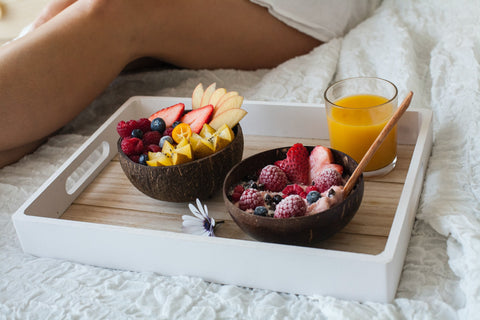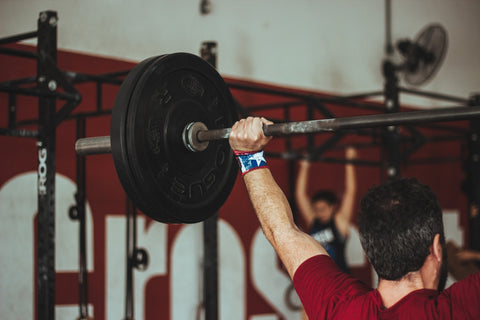While there are so many different factors that play a role in living healthy lifestyles, sleep and nutrition are two major components that can affect one another. If we do not get adequate sleep, it may in turn make us less inclined to make healthy eating a priority.
Many environmental and behavioral factors contribute to how well we sleep and how much sleep we can get (2). Specifically, things like increased screen time, late work shifts, and social stress have created altered sleeping habits in the general population. In the current state of the world, we are in today, the COVID-19 pandemic has particularly placed a lot of stress on individuals, lowering the amount they can sleep.
Today we are going to discuss some of the foods to eat, and foods to avoid to help you get the most restful sleep and promote better overall health.

Foods to Eat
High consumption of plant-based foods such as fruits, vegetables, legumes, and nuts as well as regular consumption of whole-grain cereals, fish, and dairy products rather than other sources of refined carbohydrates and animal proteins have been associated with better sleep quality (1).
Here are a few of the foods we want to highlight for you to try and include in your meal or snack before bed!
1. Kale: Kale provides adequate dietary fiber and calcium which can help our bodies produce more melatonin.
2. Kiwi: Kiwis are rich in vitamin C, vitamin E, vitamin A, and folate. They also contain the hormone serotonin. This sleep hormone is related to rapid eye movement (REM) sleep and low levels may cause insomnia.
3. Tart Cherries: Cherries act as a natural sleep aid as they are rich in melatonin, a naturally produced hormone that aids in sleep (3).
4. Almonds: Nuts are a great muscle-relaxing magnesium source. Among all types of nuts, almonds are deemed one of the best foods that help you sleep as they are also high in calcium. Calcium works to help convert a specific amino acid, tryptophan into sleep-inducing melatonin which will calm the body and relax the muscles.

Foods to Avoid
1. Fatty foods: Foods that are especially rich in saturated fats take longer to digest. These include many animal products such as butter, fatty meats like bacon and sausage as well as oils like coconut and palm oil. High consumption of these will keep your body up working rather than trying to relax. Additionally, these foods fatty foods have the potential to cause gastrointestinal discomfort which can lead to altered sleep cycles.
2. Refined carbohydrates: Examples of refined carbohydrates include white bread, pasta, pastries, white flour, white rice, sweet desserts, and many breakfast cereals that should be limited or avoided directly before bed as they have been seen to also have an impact on sleep duration (3).
Sleep and nutrition is a two-way street – nutrition can both promote a good night's sleep and the amount of sleep you get can influence what you eat throughout the day.
Make sure to include nutrient-dense meals, as well as adequate amounts of fruits and vegetables every day to help you get the best rest possible!
References:
1. Godos, J., Ferri, R., Caraci, F., Cosentino, F. I., Castellano, S., Galvano, F., & Grosso, G. (2019). Adherence to the Mediterranean diet is associated with better sleep quality in Italian adults. Nutrients, 11(5), 976. doi:10.3390/nu11050976
2. Castro, M. A., Garcez, M. R., Pereira, J. L., & Fisberg, R. M. (2019). Eating behaviors and dietary Intake associations with self-reported sleep duration OF FREE-LIVING Brazilian adults. Appetite, 137, 207-217. doi:10.1016/j.appet.2019.02.020
3. Peuhkuri, K., Sihvola, N., & Korpela, R. (2012). Diet promotes sleep duration and quality. Nutrition Research, 32(5), 309-319. doi:10.1016/j.nutres.2012.03.009
Author: Karli McCarthy
Cal Poly, SLO Nutrition Student
@kale_n_it_karli




